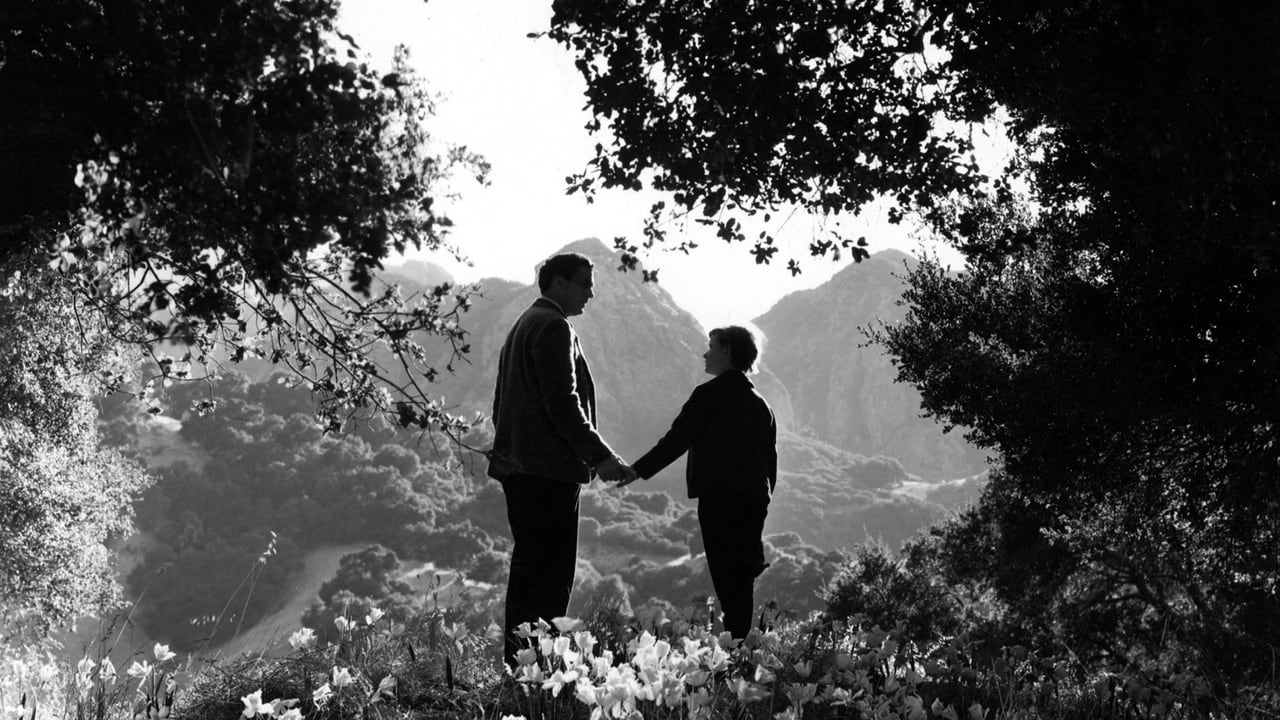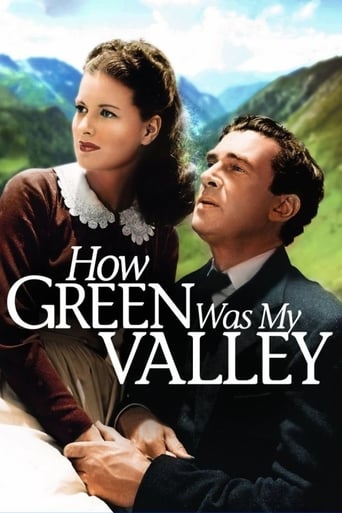

My vote for the most under-appreciated film of all time far and away goes to How Green Was My Valley. This beautiful drama, masterfully directed by John Ford, had the unfortunate coincidence of being released in 1941, the same year as the seminal masterpiece, and freshman full-length directorial effort by Orson Welles; Citizen Kane. Welles' Citizen Kane is an important film, brilliant in technical achievement and instrumental in terms of influence to the best of film directors. You'll scarcely find a person willing to argue the importance and effulgence of Citizen Kane; you will often, however, find people willing to downplay How Green Was My Valley, as if dimming its light will make Kane shine brighter. It's time to forgive the film starring Maureen O'Hara, Roddy McDowall, and Walter Pidgeon for taking the Academy Award for Best Picture that many believe to be owed to Citizen Kane. Release the hate for How Green Was My Valley, the film following the heartbreaking lives of the impoverished Welsch mining Morgan family. Sure, there are places in which How Green Was My Valley is recognized for its sheer brilliance, but more often is the film vilified for being perceived as a "lesser film" to Welles' Citizen Kane. The fact of the matter is that both Citizen Kane and How Green Was My Valley are perfect films (I don't use that term lightly) and need to be respected as such. It's not as if How Green Was My Valley was a horrible film undeserving of Oscar's top prize, surpassing an obviously superior film; it was just as good, if not better than Citizen Kane just in different ways. Oscar has made that mistake before (I'm looking at you, 1994) but they did not award a film that was undeserving in 1941. 1941 was a stacked year for American films, being the same year that audiences were graced with The Maltese Falcon and Suspicion. I long to live in a world where How Green Was My Valley is given its due, and this is my slight contribution to that dream. Huw Morgan (Roderick McDowall) is the youngest member of the struggling, hard-working Morgan family. From his point of view, the audience gets to experience what life is like for each of the members of his family, while his family tries their hardest to make sure he has a better life than each of his siblings before him. The family is embattled with many trials and tribulations including layoffs, famine, and labor disputes. As the role of the worker, shifts throughout the years in the Welch mining town in which the Morgans live, so too do tensions rise within the Morgan family. As the men battle the dangerous, unhealthy working conditions in the mines day in and day out, the women in the family struggle to take care of the home and feed each member of the family on the meager income that is brought in. The eldest daughter, Angharad (Maureen O'Hara) has fallen desperately in love with Preacher Mr. Gruffydd (Walter Pidgeon) who loves Angharad, as well, but is not certain he can provide an adequate life for her. Their romance is also tested by the gossip of the town at the wretched thought of a young girl and a preacher falling in love. Following Huw as he ages and learns from the mistakes and turmoil his family endures, How Green Was My Valley is a beautiful story capturing the heart of everything that American cinema is capable of being.John Ford is the ultimate master of the melodrama. The same mind that brought audiences The Grapes of Wrath, Stagecoach, and The Man Who Shot Liberty Valance, John Ford was at the top of his already stellar game with his adaptation of How Green Was My Valley, based on the novel of the same name by Richard Llewellyn. It has been noted that How Green Was My Valley was Ford's favorite of the films he directed, and it is easy to see why. How Green Was My Valley was a beautifully shot, artfully told story that really made personal the struggles endured by the Morgan family. How Green Was My Valley remains a gorgeous, heartwarming, grand film that can also be described as undervalued, under-appreciated, and oft forgotten, except when arguments arise as to the merit of How Green over Citizen Kane. Citizen Kane was a pioneer, and deserves the status it receives as such, but How Green Was My Valley was a forger of the melodrama. A brilliant film, despite the technically superior Citizen Kane, that proves to all fans of classic cinema that two wonderful films don't need to be pitted against each other, and instead, should be enjoyed for exactly as each stands on its own.
... View MoreWhat stays with me is the singing. They sing on their way to work. They sing on the way home from work. They sing at weddings, funerals, church services. They sing during downtime, during happy occasions and during sad occasions. Their singing comes in the form of choral arrangements that doesn't come from formal practice but from their very souls. When they sing it comes from the echoes of the past, of the heritage passed down from their fathers. Their singing sweeps across the hills and becomes part of their daily breath.John Ford's adaptation of Richard Llewellyn's book How Green Was My Valley is a movie about the hardships in a small 19th century mining town in Southern Wales, in which the people live in poverty and grief yet they sing all the time. Were it not from the singing this might be just another good-looking memoir, so the singing gives it texture.The movie is a memoir told from the point of view of a man who is about to leave his native land. He tells us his story in flashbacks so that we understand where he came from and why he is eventually driven to vacate. This is a mining town, but it has become so industrialized and over-populated that the place no longer resembles the land of his formative years. The story is told from the point of view of the young Huw (Roddy McDowell) as he watches the hardships within his own family. His proud father (Donald Crisp) and his mother (Sara Allgood) struggle against generational differences to hold their family together. Among the siblings are Ivor (Patric Knowles), Huw's older brother, and Angharad (Maureen O'Hara) his older sister. There is also Bronwyn, Ivor's wife whom Huw harbors a serious crush. And there's Mr. Gruffydd (Walter Pidgeon) a good-hearted minister who marries Huw's sister.The problems within the family have to do with the children's restlessness, and their desire to escape the generational heritage to find their own way in the world. The first cracks begin to form when the mine worker's pay is cut and they go on strike. The boys in the mine want a strike, but Mr. Morgan is supports the mining company and, for a short time, becomes the town pariah. This is the beginning of their problems and won't end until the Morgan children are scattered across the globe.The heritage given to the children of this town is to work in the coal mines. Everyone has their problems, whether they be marital strife, accusations by the church or simply a matter of personal difficulties that turn into life-long grievances. This is not a happy story to say the least. Even little Huw has his problems at school where an egotistical teacher makes him humiliates him in front of the class because of his low social standing.The narrative given in How Green Was My Valley feels more like pieces and short stories rather than one continuous thread. It looks and feels like pieces of memory and that would be fine if we felt any real connection with the characters. We can't help but feel for them, but while we understand their circumstances, the characters remain sort of unknown to us. We feel the texture of their location and their heritage, but the individuals are missing. There are things in the movie that work. John Ford creates a sense of time and place and of memories. We feel that these are events that are being looked back on, but something in the intimate detail is simply not there. We reach for the emotional pull but our hands grasp at empty air.Possibly for that reason, the film's historical legacy is not so great. Despite being acclaimed at the time, earning ten Oscar nominations and taking home the prize for Best Picture, How Green Was My Valley has more or less faded into obscurity. It is rarely screened on television except in the occasional annual Oscar marathon and even then only rarely does it show up. That could be because the film doesn't really reach out to the viewer. The involvement factor remains somewhat at arms-length. Well-made as it is, the movie feels like homework. It is not the first John Ford movie that you reach for or even the second or third or fourth. This is a film with just as many things that work as things that don't. There are elements that stay with me, but as a whole, it doesn't.
... View MoreWhat can you say about a film that is known less for the fact that it won the Academy Award for Best Motion Picture than the fact that it beat out Citizen Kane? It also beat out The Maltese Falcon and Sergeant York--both of which, I would argue are more revered today than HGWMV.I will not assign a score to this film, because I did not watch all of it. This is not to say that it's a bad film, but I grew tired of the painfully precious tone at the beginning of the film, coupled with the very heavy-handed dramatization.John Ford directed many fine films (for example The Quiet Man),but in this film I felt at times that he thought he was directing a silent film, so overly dramatic was the action and the behavior of the actors.The story is primarily about a family of miners, the Morgans. They live in a valley with a one-industry economy. This is a prescription for economic instability. There may be a great story in the trials of the town and the Morgan family, but the film's slowness and it's reliance on overdramatization stopped me from watching its entirety. Perhaps one day I will watch it again, being prepared for it's style ahead of time.
... View MoreHow Green Was My Valley. The film infamous for beating Citizen Kane at the Oscars. Not only that but The Maltese Falcon and Sergeant York too. Although it's known that it this was due to a public affairs issue at the time, How Green Was My Valley is one of the earliest cases of Oscar baiting I've ever seen. Perhaps this was the film that shaped the mould? It has everything the Oscars dream of and in the most sentimental doses too. As all Oscar baited films, it feels like it skims the surface of its story and its sequences feel more like a checklist rather than organic storytelling. Singing, disability, kindness, hardships. Even today, it feels forced, especially the character archetypes. That said, the performances are pretty good given the contrived platform to work with. The overall drama about the strikes and the family conflict is quite interesting and engaging, but the depth of the film is rather laughable. Its triumphs and tragedies are just too romanticised to be convincing, especially the depiction of Wales which is just far from the truth. That said, the cinematography is really great and definitely the best part. Its story can be trite, but it's very watchable and entertaining. But that's all its trying to be anyway. That and a good cry from sensitive hearts.6/10
... View More